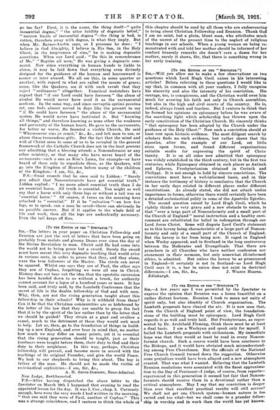[To THE ED/TOR or THE " SPECTATOR."] you allow me
to make a few observations on two questions which Lord Hugh Cecil raises in his 'interesting articles? Before referring to these questions I would like to say that, in common with all your readers, I fully recognize his sincerity and also the intensity of his conviction. His courage, too, is conspicuous, and the Christian world owes him much for avowing •his faith not only in Church assemblies, but also in the high and civil courts of the country. He is indeed, always frank and fearless. But I venture to think that he formed his opinions on episcopacy before he was aware of the searching light which scholarship has thrown upon the early constitution of the Christian Church. He sincerely thinks " that episcopacy has been adopted by the Church under the guidance of the Holy Ghost." Now such a conviction should at least rest upon historic evidence. The most diligent search by scholars finds no such evidence, but rather shows that the Apostles, after the example of our Lord, set little store upon forms, and found different organizations suitable media for expressing the spirit of Chris-
tianity. It is on all sides now admitted that episcopacy was widely established in the third century, but in the first two centuries, while Episcopacy obtained in such places as Antioch and Ephesus, Presbyterianism obtained in Corinth and Philippi. It is not enough to hold by sincere convictions. The convictions must have a well-informed basis, and in this instance the testimony of history is conclusive that the Church in her early days existed in different places under different constitutions. As already stated, she did not attach undue importance to forms, otherwise there would certainly have been a detailed ecclesiastical polity in some of the Apostolic Epistles.
The second question raised by Lord Hugh Cecil, which he rightly thinks as very grave and a new obstacle to union, is that "over a large part of Nonconformity and a small part of the Church of England" moral instruction and a healthy envi- ronment are substituted for belief in redemption through our Lord Jesus Christ. Some will dispute Lord Cecil's statement as to this heresy being characteristic of a large part of Noncon- formity and only of a small part of the Church of England. But the heresy is far from being new. It raged in England when Wesley appeared, and in Scotland in the long controversy between the Moderates and Evangelicals. That there are preachers in all Churches who have neither confession nor atonement in their sermons, but only somewhat ill-informed ethics, is admitted. But unless the heresy be as pronounced in England—it certainly is not in Scotland—as Lord Hugh Cecil says it is, a bar to union does not exist in doctrinal


































 Previous page
Previous page